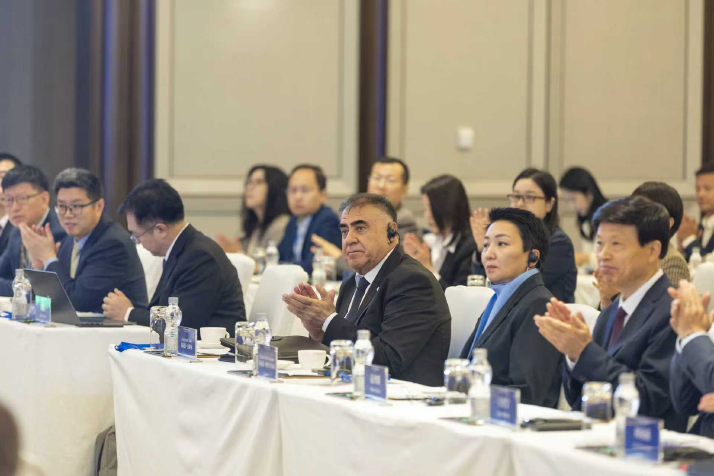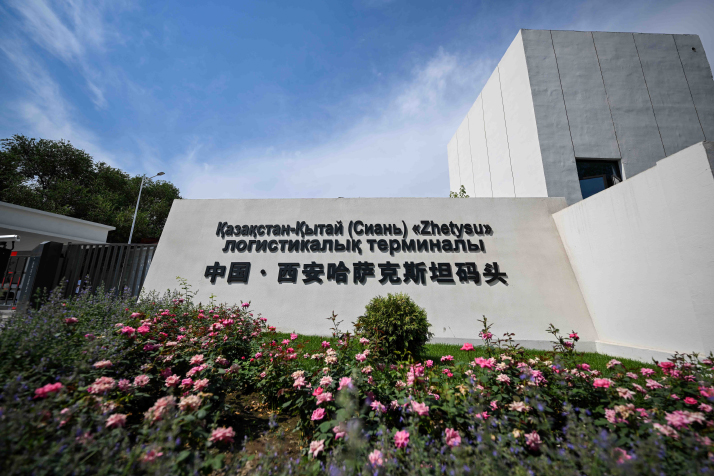| World |
| A new way forward | |
|
|
 Participants at the Global Governance Roundtable for Shanghai Cooperation Organization Countries 2025 in Beijing on October 16 (COURTESY PHOTO)
China's newly proposed Global Governance Initiative (GGI) was a major topic of discussion at the Global Governance Roundtable for Shanghai Cooperation Organization Countries 2025, held in Beijing on October 16. Consensus at the meeting was that the GGI responds to the shared aspirations of people around the world, meets the pressing needs of the times and injects fresh momentum into building a fairer, more just and more inclusive international order. Jointly organized by China International Communications Group (CICG), the Shanghai Cooperation Organization (SCO) Secretariat and the China Institute of International Studies (CIIS), the event brought together more than 150 scholars and officials from China and abroad. Building consensus Chinese President Xi Jinping proposed the GGI at the "SCO Plus" Meeting in Tianjin Municipality on September 1. "I look forward to working with all countries for a more just and equitable global governance system and advancing toward a community with a shared future for humanity," Xi said when addressing the meeting. The initiative outlines five core principles: adhering to sovereign equality, abiding by international rule of law, practicing multilateralism, advocating the people-centered approach and focusing on taking concrete actions. According to United Nations Resident Coordinator in China Siddharth Chatterjee, the timing of the GGI reflects growing global crises marked by the digital divide, climate change, geopolitical tensions and widening inequality. The GGI provides a forward-looking framework that brings countries together and calls for a greater voice for developing nations, as well as deeper consultation and broader consensus on issues concerning science, technology, human wellbeing and global governance, he said. CICG President Chang Bo said the roundtable, held under the SCO framework, embodies the Shanghai Spirit by enhancing mutual understanding and trust among member states, and represents concrete action in implementing the GGI. He emphasized that platforms such as the SCO should remain committed to openness and inclusiveness, expanding global cooperation in governance; to innovation, in order to unleash greater efficiency in governance; and to mutual learning among civilizations, which lays a shared foundation of values for global governance. Nurlan Yermekbayev, Secretary General of the SCO, echoed these remarks, noting that in recent years the organization has become an important platform for the exchange of national governance experience. "Member states have reached consensus and taken practical steps in areas such as political security, economic and trade cooperation, and cultural exchange," he said. Sun Linjiang, Special Representative of the Chinese Government on Eurasian Affairs, said China is ready to work hand in hand with partners across the SCO family to practice the shared values of humanity and to implement in a systematic way the four China-proposed global initiatives—the Global Development Initiative (GDI), the Global Security Initiative (GSI), the Global Civilizations Initiative (GCI) and the GGI.  Signage of China-Kazakhstan (Xi'an) Trade Logistics terminal in Almaty, Kazakhstan, on August 1 (XINHUA)
A global vision The GGI is the fourth of these landmark global initiatives, following the GDI proposed in 2021, the GSI in 2022 and the GCI in 2023. China has emerged as a key contributor to multilateral cooperation over recent decades, Chatterjee said on the sidelines of the roundtable. He stressed that the GGI calls for a system in which developing countries have a stronger voice. During the event, participants also held in-depth discussions across three subforums focusing on practicing multilateralism, deepening trust on security and upholding openness and win-win cooperation. Through the GDI, China has aligned South-South cooperation and the UN Sustainable Development Goals, supporting projects in poverty reduction, food security and green transition; through the GSI, it has reaffirmed the centrality of the UN Charter, serving as the largest troop contributor and second largest financial contributor among Security Council members to UN peacekeeping and extending support to African Union operations, Chatterjee said. Through the GCI, it has promoted dialogue and mutual understanding, culminating in the UN's recognition of June 10 as the International Day for Dialogue Among Civilizations, he added. "At the national level, the UN Country Team in China, which I am privileged to lead, continues to work in close partnership with the government of China to translate global commitments into concrete results. Guided by the UN Sustainable Development Cooperation Framework, our collaboration supports China's journey toward carbon neutrality, inclusive innovation, and enhanced global engagement, including through cooperation with the SCO region and beyond," he said. There are great opportunities for China's economic growth prospects, as the country has implemented the 14th Five-Year Plan (2021-25) very effectively and is steadily moving toward the 15th Five-Year Plan (2026-30). In the first three quarters of this year, the world's second largest economy grew 5.2 percent year on year, contributing roughly 30 percent of global growth. China's foreign trade powered ahead with high-quality growth in the first nine months of this year despite increasing external headwinds, according to the General Administration of Customs of China. Total merchandise trade in yuan-denominated terms rose to 33.61 trillion yuan ($4.71 trillion) from January-September, up 4 percent year on year. "I'm quite confident and optimistic about China's economic growth, prosperity and bringing everybody along to progress toward human development," Chatterjee said. Sudheendra Kulkarni, founder of the Forum for New South Asia and formerly an adviser to then Indian Prime Minister Atal Bihari Vajpayee, called for greater efficiency and solidarity among Global South countries, emphasizing that closer cooperation between China and India could unleash enormous potential. If China and India can stand together and stay on the same wavelength, it will massively boost the collective power of the Global South, he said. Kulkarni observed that the world is now "shifting from a Western-dominated old order toward a new order increasingly shaped by the Global South." However, he warned that some Western nations still cling to the principle that "might makes right," citing the United States' lack of respect for multilateral mechanisms such as the World Trade Organization, its use of tariffs as political weapons and its tendency to lecture others on global governance. He underscored that the most important aspect of the GGI is the people-centered approach. "Both development and governance must place people at the heart of their purpose," Kulkarni said. "Without putting people first, there can be no better world order." Copyedited by G.P. Wilson Comments to liwenhan@cicgamericas.com |
|
||
|
||||||||||||||||||||||||||||
|